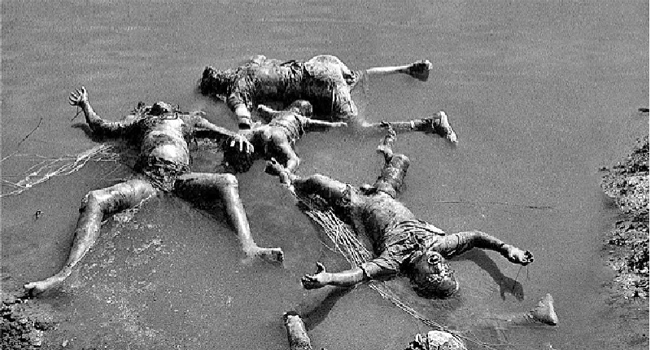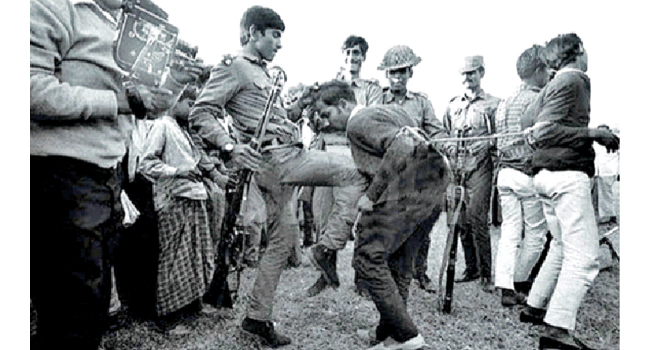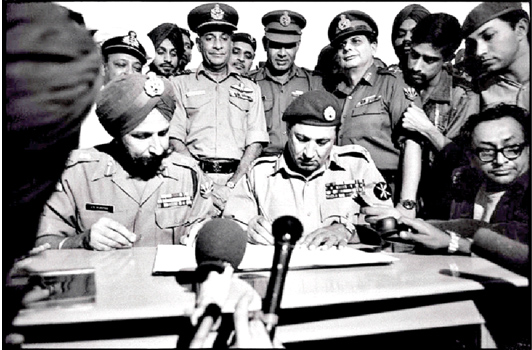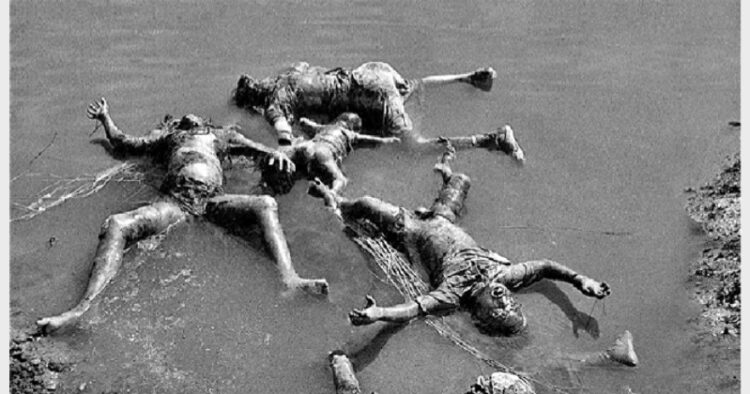
Pakistan’s brutality can be seen in this undated photo of 1971 war.
Not even an infant could escape this viciousness
Not even an infant could escape this viciousness
If Nazis could be tried as late as in 2018 i.e. after 73 years, and Japanese could be forced to apologise and pay compensation to Korean sex slaves after70 years of the end of World War II, then similar trial of war criminals and apology and compensation to Bangladeshi victims of Pak genocide just after 48 years is not out of place
Brig R P Singh, VSM (Retd)
Pakistan has been spreading fake news about Indian Armed Forces’ atrocities (Imaginary) being committed on Kashmiri civilians. The Indian Army is a highly disciplined force. Moral values are instilled in its officers’ corps from the very first day of their joining the training academy. These values have remained the hallmark of Indian Armed Forces since Independence. In 1971 during the Bangladesh Liberation War, Pakistan Army, on the other hand, carried out the genocide of Bangladeshis of the scale which had put even Halaku and Hitler to shame. While on the other hand, Indian Army which fought for liberation of Bangladesh did not have a single case of any ill-treatment of civilians. On March 12, 1972 when the Indian Army finally left Dhaka after presenting the guard of honour to the first President and father of the nation of the newly born country, Sheikh Mujibur Rehman, praises were showered on Indian soldiers for their friendly behaviour from all corners of Bangladesh. But it appears that we Indians seem to have forgotten these historical facts. As far as Pakistanis were concerned, they were kept in the dark by the military dictator Yahya Khan as the shameful deeds of Pak soldiers were whitewashed by the state-controlled media. I had been witness to all those events. Brief of the events is narrated in the succeeding paragraphs.
After the creation of Pakistan and 12 years of military dictatorship, first and last fair and free elections based on the universal adult franchise were held in United Pakistan in December 1970. The Awami League headed by Sheikh Mujibur Rehman aka Bangabandhu got massive mandate by winning 167 out of 169 seats in East Pakistan. Mujibur Rehman thus had an absolute majority in the 314 member Pakistan National Assembly. In West Pakistan, out of 144 seats, ZA Bhutto’s Pakistan People’s Party (PPP) got 88. But PPP was limited to only two provinces i.e. Punjab and Sindh. In Baluchistan and NWFP (now called Khyber Pakhtooonkhwa) regional parties had won almost all the seats. Sheikh Mujibur Rehman staked his rightful claim to form the government, but Bhutto created impediments in the formation of new administration. Military dictator, Gen Yahya Khan in connivance with ZA Bhutto, launched military crackdown codenamed ‘OP Searchlight’ at zero hours on March 26, 1971. He put Sheikh Mujibur Rehman in Mianwali Jail in West Pakistan. All leaders of Awami League and other parties escaped to India and with Indian help launched liberation war against Pakistani occupation forces.

Pakistani soldiers rounding up a Bangladeshi liberation fighter in 1971
In the 267 days, from March 26 to December 16, 1971 of Op Searchlight, thirty lakh Bangladeshis were killed in the history’s worst savagery committed by Pakistan Army. More than four lakh women were raped. The international aid and relief agencies reported that more than seventy thousand babies were born after the Liberation War. One crore refugees fled to India to escape the genocide. Old men and women were forced to witness the killing of their sons and rape of their daughters and daughters-in-law by Pakistani soldiers. Small babies were flung in the air and with rifle bayonets. Their valuables were looted and houses torched. Private parts of the young rape victims were ruptured with rifle bayonets. Indescribable methods of torture were used in committing the savagery. Sadistic perverseness of Pakistani soldiers had crossed all limits. All these events were very well recorded by international media, international governmental and non-governmental organisations and are available even on the internet. Hindus were particularly targeted as seventy four per cent of rape victims, sixty-two per cent of those who were killed and sixty five lakhs refugees out of one crore who escaped to India were Hindus.
USA and China supported Yahya Khan’s military junta in the savagery. US President Richard Nixon and his National Security Advisor (NSA), Henry Kissinger, ignored US public and media opinion. However, eminent leaders and citizens like Edward Kennedy, George Harrison and Bob Dylan from the USa supported the cause of Bangladeshis. The reason for Nixon turning a blind eye to Yahya’s cruel deeds in Bangladesh was Pakistan’s facilitation of historic secret visit of Kissinger to Beijing in July 1971. The result of the new-found bonhomie between USA and China was a significant alliance against the Soviet bloc and Moscow’s friends like India. The new USA-China-Pakistan Axis changed the strategic equations in the cold war driven world. Being under obligation to Yahya, Nixon disregarded US Congressmen, his Secretary of State and the world opinion when Bangladesh was being devastated by the Pakistan Army and their collaborators.

Lt Gen Niazi signing the Instrument of Surrender
under the gaze of Lt Gen JS Aurora
under the gaze of Lt Gen JS Aurora
India with USSR’s cooperation, came out in full support, against all the odds, for the cause of Bangladesh liberation. Despite being poor, India shared whatever it had with the Bangladeshi brothers and sisters and opened its door for the refugees whose numbers rose to one crore by November 1971. New Delhi helped in establishing the provisional government of Bangladesh, which was operating from Kolkata. Indian Army provided all assistance in raising, organising, training and equipping and paying wages to Mukti Bahini (Bangladesh Liberation Force). By the end of November 1971, Bangladesh forces were organised in three Infantry Brigades with requisite Artillery and almost one lakh guerrillas. Seven Indian and eleven Bangladeshi sectors deployed along Indo-Bangladesh border facilitated Mukti Bahini’s guerrilla operations. Bangladesh also had small navy and air force. With the formation of joint command of Indian and Bangladeshi forces under Lt Gen JS Aurora, GOC-in-C Indian army’s Eastern Command, in November 1971, the noose around the Pakistan occupation Army in Bangladesh was tightened.
On December 3, 1971 war-hysteric Yahya Khan ordered air attacks on eight Indian Airfields. The Joint Forces were waiting for such provocation and launched their multi pronged offensive from all directions to liberate Bangladesh. The Indian Navy blockaded the Bay of Bengal and Indian Air Force pounded the Pakistanis from the skies. The whole affair was finished by Joint Forces in just 12 days, forcing the Pakistan Army’s 93,500 all ranks to surrender. The victory was gained against all the odds. The USA dispatched its mightiest naval task force of Seventh Fleet to the Bay of Bengal. It was supported by Great Britain which dispatched Royal Navy armada to the Arabian Sea. Both naval forces were checkmated by USSR’s navy forcing British armada to take a U-turn and the seventh fleet downing its anchors mid Bay of Bengal.
China made noises on India’s Himalayan frontiers but was contained by India and countervailed by the USSR which deployed its forces on the Sino-USSR border and had even ordered the deployment of its nuclear weapons out of silos. The clouds of nuclear war hovered on the horizon. But the biggest challenge was on the diplomatic front. In the UN all western countries, USA-allies, China and the Muslim nations formed a bloc to strangulate Indo-Bangladesh joint forces attempts to liberate East Bengal. These moves were stalled with usage of veto power by USSR and skilful diplomatic manoeuvring by India under shrewd Foreign Minister Swaran Singh.
Despite losing in numerous battles on all fronts, sadistic genocide activities of Pakistan Army continued till the end of the war. A day prior to surrender Pakistanis picked up numerous Bangladeshi intellectuals and prominent citizens and killed them in cold blood. After the surrender of 93,500 all ranks of Pakistani forces in front of Lt Gen J S Aurora on December 16,1971 at 16:31 hours (IST), 194 Pak Army Personal and 3 each from Air force and Navy were identified as war criminals out of whom five war criminals were let off on humanitarian grounds. This however, did not include the name of Lt Gen Tikka Khan, who wore the twin hats of being the Chief Marshal Law Administrator and Commander of Pakistani forces in Bangladesh from March 26 to April 11, 1971. He masterminded butchering of lakhs of civilians and ravaging Bangladesh. Having been let off he later earned the sobriquet of ‘Bomber of Baluchistan’ where he again killed thousands of innocent Baloch people.
Sheikh Mujibur Rahman, immediately after his return from Pakistani captivity on January 10, 1972, initiated a formal process of war crimes trial. On March 29, 1972, Bangladesh Government announced a formal plan to try some 1,100 Pakistani military prisoners, including generals AAK Niazi and Rao Forman Ali Khan. On June 14, 1972, India agreed to deliver 150 war criminals, as the first instalment, including Lt Gen AAK Niazi to Bangladesh. On June 19, 1972 — ten days before the Simla meeting between Zulfikar Ali Bhutto and Indira Gandhi, Sheikh Mujibur Rahman reaffirmed his commitment to try the War Criminals. However Pakistani President ZA Bhutto by his smart talk convinced Indira Gandhi that Pakistan will conduct trials on its own soil. However this promise turned out to be a big bluff. In the case of Sheikh Mujibur Rehman, Bhutto tried entirely different tactics. Bhutto played his devilish card by threatening to make the 400,000 Bangladeshis who lived in West Pakistan hostages. He wanted to use them as bargaining chips to free the Pakistani war criminals. Bangladeshi army officers who were serving in West Pakistan were put in “concentration camps.”
In a press conference on August 10, 1972 Bhutto said that if Bangladesh believed “it had a kind of veto over the release of our prisoners…there is a veto in our hands also.” He requested China to use its veto power to bar Bangladesh from becoming a member of UNO which was critical for the war-torn country. Beijing cast its first veto on August 25, 1972 in the Security Council to bar Bangladesh’s UN membership. Bhutto insisted that Pakistan would recognise Bangladesh only after Pakistani prisoners were released. In November 1972, Bangladesh and India decided to repatriate some 6,000 family members of Pakistani PoW. In response, Pakistan agreed to release 10,000 Bangladeshi women and children. However, the fate of most Bangladeshis trapped in Pakistan remained uncertain. On April 17, 1973, after four days of bilateral talks, Bangladesh and India announced a “simultaneous repatriation” initiative to end the prisoner-deadlock. Bangladesh, however, made it clear that India would not release any of the war criminals whom it would try along with local collaborators.
Bhutto furiously refused Bangladesh’s contention of trying accused Pakistanis in Bangladesh. He threatened that if Bangladesh carried out the trial of the Pakistanis, Islamabad would also hold similar tribunals against the Bangladeshis trapped in Pakistan. Pakistan quickly seized 203 Bengalis as virtual hostages. Bhutto argued that if Bangladesh tried its PoWs, Pakistanis who were already ‘terribly upset’ would topple Pakistan’s political leadership. He claimed that his government had already arrested some top-ranking military officials for conspiracy.
After about one year, Bangladesh finally accepted Pakistan’s proposal, fearing for the fate of Bengalis trapped in Pakistan and to gain the much-needed access to UNO. With faith that Pakistan would hold the trial of the Pakistanis involved in the wartime atrocities, Bangladesh withdrew its demand for trying the Pakistanis in Dhaka. Upon the formal understanding, the last group of 203 detained Bangladeshis was allowed to return home on March 24, 1974. Bangladesh’s position was formalised on April 10, 1974 through a tripartite agreement among Bangladesh, India, and Pakistan. Pakistan offered apology to Bangladesh on the same day.
Releasing the War Criminals was the biggest folly of Sheikh Mujibur Rehman and Indira Gandhi. Barring few senior officers among them-who were sacked for professional incompetence and not war crimes-all others’ services were continued. Some of them became Major Generals and Lt Generals. Some of these officers were masterminds of hatching the ISI-CIA joint conspiracy to murder Sheikh Mujibur Rehman and 27 of his kin on August 15, 1975. They also orchestrated Sikh militancy in Punjab which ultimately resulted in the assassination of Indira Gandhi on 24 October 1984; and terrorism in J&K. Some of these officers also trained Afghan Taliban. Thus instead of “ushering an era of peace and tranquillity” the release of war criminals resulted in ”Unleashing the reign of terror.” There is hardly any family in Bangladesh which was not affected by the Pakistani genocide. The rape victims are still suffering the agony of being outcasts, and the war babies are under tremendous psychological distress being rootless citizens on the planet. Because all these war babies were given to foreign agencies for adoption since the Bangladesh government did not want to keep Pakistani blood on its soil. But the surviving war criminals are still enjoying luxurious retired life on the wealth looted from Bangladesh.
The rape victims are still suffering the agony of being outcasts. they are under tremendous psychological distress being rootless citizens on the planet
The validity of the decision to let off the war criminals without trial by the then Indian and Bangladesh governments is questionable. These crimes were committed against humanity and no one had the authority to let the delinquents go unpunished. Moreover, Pakistan has not fulfilled its commitment to try war criminals. It is believed that more than 90 war criminals are still surviving. It is time for right-minded Indian citizens to build consensus through different means, including social media, for starting the trial process for them. Bangladesh Government’s hands are tied due to the Tripartite Agreement of April 10, 1974. Therefore citizens will have to build world opinion. If Nazis could be tried as late as in 2018, i.e. after 73 years; and Japanese could be forced to apologise and pay compensation to Korean sex slaves after 70 years of the end of World War II; then similar trial of war criminals and apology and compensation to Bangladeshi victims of Pak genocide just after 48 years is not out of place. Indulgence of every Indian is solicited for this noble cause.













Comments